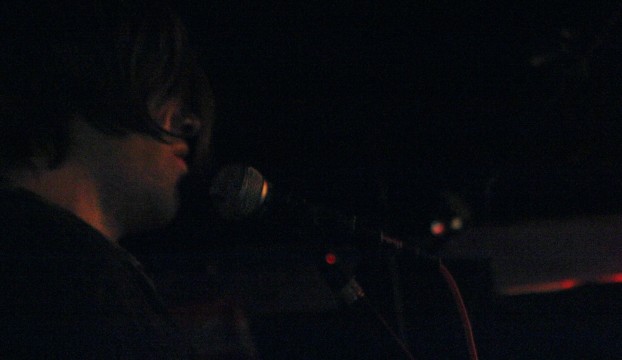In an attempt to shine light on local music, The Lantern’s “Columbus’ Own” is a weekly series that will profile a new Columbus band each week.
There is no formula when it comes to making good music in the long haul. In reality, where the things considered incredible could also be perceived as terrible, the best case scenario for success settles on a platform that compromises with the trend of the times.
All the same, some musical collaborators can beg, borrow and steal into the niche dream, whatever that might be.
Might as well begin with half a drum set and a bunch of guitar players.
“It’s called cocktail style, it’s old school s—,” said Ian Bates — The Pools’ guitarist and drummer — of the band’s unconventional drum setup.
The Pools are made up of bassist Jamie Rymers and a guitar-driven cast consisting of Bates and guitarists Nate Berkemer and Robbie Ottaviano, who are all readily able to dominate any six-string instrument plugged into an amplifier.
Each of the three guitarists has figured out how to play a “cocktail” drum kit — in this instance, a floor tom, a snare drum and a ride symbol — and therein trade each other the roles between playing guitar and drums.
There’s no set pattern or role to play within the instrumentation of The Pools, Bates said.
Granted, the instrumental rotation doesn’t take away from The Pools’ main priority.
“You hit a g-d— power chord and that’s louder than you could ever g-d— scream,” Bates said.
Long story short: The Pools are loud.
“(Playing loud is) the maximization of denying people the opportunity to be distracted from rock ‘n’ roll,” Berkemer said, providing reason for the loud guitars of The Pools.
However, playing loudly doesn’t necessarily come without sacrifice. The group’s live vocals are drowned in catchy guitar progressions and accompanying leads during the live set.
But The Pools have recordings in the works, portraying an arrangement that delivers the true concept of the band.
“It’s like a piece of masking tape over the crack in a sculpture — yeah, it covers the crack, but it’s still a piece of masking tape,” said Bates, in reference to poor vocal mixes he’s heard in the past.
“Anything to make a motif, I guess,” Berkemer added. “Believe this bulls— message of whatever we have to say.”
“We write songs that we like to listen to,” Bates said, provoking a high-five with Berkemer.
Each of the axe-wielders write their own lyrics and individually sing the respective compositions. Though the tight-knit brains of the band write alone, the content topically hangs on a similar themes, even if the words are fully revealed to one another before completion.
“The lyrics are all pretty similar — they’re all pretty bleak,” Bates said, with Berkemer’s agreement.
“Making music together is a really amazing kind of friendship that you don’t have with all of your (other) friends — when you have people that you do that with and have done that with. You’re looking at it through a microscope, through a timeline,” Bates said, “It’s cool.”
There are three types of music “on the face of this earth,” in Bate’s opinion: “The s— that you participated in, the s— you listen to that you made, and the s— that you listened to that you didn’t (make).”
Having been in several bands before this project, including Oskorëi and Les Roms, and eventually being left to find a new output, Bates and Ottaviano stuck together.
Bates’ outlook at the time was, “F— whether or not we play shows, let’s just write music.”
So Bates and Ottaviano pressed on until they heard word about an opportunity to reconvene with an old friend returning to town.
Berkemer spent 2008 through 2009 in New York and then returned to Columbus.
After working with Bates at Jeni’s Splendid Ice Creams and seeing The Pools perform, bassist Rymers (Sega Genocide) offered his services to the group.
It was on similar terms that The Pools landed an offer to record its first record.
After The Pools’ second performance at Double Happiness in the Brewery District, the bar’s sound man, booker and local producer told the group he was interested in recording the band.
The decision to record is always based on timing and finances, in Bates’ view. The Pools only happened to be in a place where they could accept and afford the local producer’s offer.
Studio 83 — behind Double Happiness, which is located at 482 S. Front St. — housed the recording sessions. The day the band was booked for recording time, the group showed up around 6 p.m.
That night, the quartet completed all of the instrumental tracks to its upcoming album in four hours.
“A month later, we went to this place, laid down the vocals, and now we’re in the mixing stage,” Bates said.
“Yeah, it took us about two weeks,” Berkemer said. “(Or), actually, like six days, maybe.”
The band paid for 16 hours, yet recorded the instrumental tracks in the time it takes for a round-trip drive between Columbus and Cincinnati.
The band sees its upcoming release as sticking to the lo-fi style that the original demo exhibits.
“We’re gonna do our own little magic on it, but yeah,” Berkemer said, agreeing to The Pools’ continuation of lo-fi production.
Bates hears three different generations of sounds on the album, ranging through the ’60s to the ’80s.
The record will time in at around 22.5 minutes, with potentially eight or nine tracks. The release date and title are both “TBD,” as Bates said.
Columbus band The Pools’ manifesto is simple: “Make the music you wanna listen to, make the s— you think is cool, rip-off your favorite stuff, be loud, be catchy,” Bates said.
“Put a sock in your pants,” joked Berkemer.





















